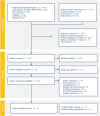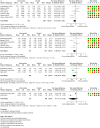Effectiveness of mHealth interventions targeting physical activity, sedentary behaviour, sleep or nutrition on emotional, behavioural and eating disorders in adolescents: a systematic review and meta-analysis
- PMID: 40761810
- PMCID: PMC12318977
- DOI: 10.3389/fdgth.2025.1593677
Effectiveness of mHealth interventions targeting physical activity, sedentary behaviour, sleep or nutrition on emotional, behavioural and eating disorders in adolescents: a systematic review and meta-analysis
Abstract
Introduction: Mental health conditions are highly prevalent among adolescents, affecting one in seven individuals and accounting for 15% of the global disease burden in this age group. The promotion of health behaviours including physical activity, nutrition, and sleep, and reduction of sedentary behaviour, has been shown to significantly improve symptoms of mental health conditions in adolescents. However, addressing this public health challenge at a population level requires scalable interventions, such as mobile health (mHealth) interventions. However, the effectiveness of mHealth interventions in achieving clinically meaningful mental health improvements for adolescents with emotional, behavioural, or eating disorders remains unclear. Therefore, this systematic review and meta-analysis evaluated the effectiveness of mHealth behaviour change interventions aimed at improving physical activity (PA), sedentary behaviour (SB), nutrition, or sleep on outcomes related to emotional, behavioural, and eating disorders in adolescents.
Methods: A systematic review and meta-analysis were conducted in accordance with PRISMA guidelines (PROSPERO ID: CRD42024591285). Eight databases were searched for randomized controlled trials (RCTs) published up to September 2024. Eligible studies included participants in early (11-14 years), middle (15-17 years) and late (18-21 years) adolescence with clinical diagnosis or self-report of emotional, behavioural, or eating disorders, where interventions targeted physical activity, sedentary behaviour, nutrition, or sleep. The cochrane risk of bias 2.0 (ROB2) and cochrane grading of recommendations assessment, development and evaluation tool (GRADE) were applied. Pooled effect sizes were calculated as standardized mean differences (SMD) with 95% confidence intervals using random-effect models.
Results: Nine RCTs involving 3,703 participants were analysed across emotional, behavioural, and eating disorders. The meta-analysis yielded a significant reduction in anxiety (6 Studies, 2086 participants, SMD [95% CI] = -0.19 [-0.37, -0.01], I 2 = 71%, with positive effects for sleep focussed interventions as well as multimodal interventions (PA, SB, diet, sleep) and eating disorders (3 studies, 732 participants, SMD [95% CI] = -0.23 [-0.44, -0.02], I 2 = 38%, with positive effects for diet and combined diet/PA interventions). In contrast, depressive (7 Studies, 1855 participants, SMD [95%CI] of -0.12 [-0.28, -0.04], I2 59%) and behavioural disorders symptoms (2 studies, 560 participants, SMD [95%CI] = -0.71 [1.77, 0.36], I 2 = 95) showed no significant pooled effect. The cumulative evidence was weakened by high heterogeneity of trial design and low overall certainty of evidence as indicated by ROB2 and GRADE assessments. Across interventions, trials characterized by higher session frequency, greater intensity (e.g., more vigorous physical activity), longer duration, and hybrid delivery methods, including some face-to-face counselling were associated with larger effect sizes but reduced scalability.
Discussion: These findings suggest that mHealth interventions incorporating health behavior modifications may effectively reduce anxiety and eating disorder symptoms in adolescents. However, modest and mixed effects on depression and behavioural disorders, together with a low number of included studies, considerable heterogeneity and low certainty of evidence, underscore the need for further high-quality RCTs to evaluate long-term efficacy. Combining mHealth interventions with standard clinical care may enhance symptom improvements in adolescents.
Systematic review registration: identifier (CRD42024591285).
Keywords: adolescent mental health; digital interventions; mobile health; nutrition; physical activity; sedentary behavior; sleep.
© 2025 Baumann, Singh, Staiano, Gough, Ahmed, Fiedler, Timm, Wunsch, Button, Yin, Vasiloglou, Sivakumar, Petersen, Dallinga, Huong, Schoeppe, Kracht, Spring, Maher and Vandelanotte.
Conflict of interest statement
The authors declare that the research was conducted in the absence of any commercial or financial relationships that could be construed as a potential conflict of interest. The author(s) declared that they were an editorial board member of Frontiers, at the time of submission. This had no impact on the peer review process and the final decision.
Figures




References
-
- WHO. Mental health of adolescents. Available at: https://www.who.int/news-room/fact-sheets/detail/adolescent-mental-health (Accessed February 27, 2025).
Publication types
Grants and funding
LinkOut - more resources
Full Text Sources

